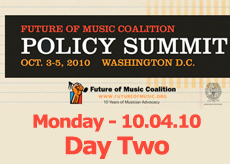Day 2: Future of Music Coalition's Policy Summit 2010
posted in: Music News
 The second day of The Future of Music Coalition’s Policy Summit covered a ton of topics for musicians and music entrepreneurs alike. On paper, some of the sessions may have seemed unrelated, but it was great to see how it all wove together by the end.
The second day of The Future of Music Coalition’s Policy Summit covered a ton of topics for musicians and music entrepreneurs alike. On paper, some of the sessions may have seemed unrelated, but it was great to see how it all wove together by the end.
Rocco Landesman, the Chairman of the National Endowment for the Arts and a powerhouse Broadway producer”who pleased many in the art world when he took on the new role”gave a terrific keynote speech about the value of arts in both the cultural and economic communities.
Landesman’s talk was followed by a closer look at the spread of broadband to rural communities, housing for artists and opportunities for musicians to perform overseas as part of cultural programs organized by the US Department of State. The session featured presentations from Jonathan Adelstein (Administrator, Rural Utility Service, US Department of Agriculture), Maura Pally (Deputy Assistant Secretary of State for Professional and Cultural Exchanges, US Department of State, Bureau of Education and Cultural Affairs) and Ron Sims (Deputy Secretary, US Department of Housing and Urban Development) and a subsequent conversation with attendees at the summit. The session helped explain why the current administration’s support of broadband expansion into rural areas matters to musicians (more online reach, more potential fans), cultural exchange programs (reaching new audiences while traveling the world and representing the US as peaceful musical representatives) and affordable housing (recognizing that not all musicians or artists can afford fair market prices”even if neighborhoods often like to tout their artistic population). The session helped connect the dots about why we, as citizens, need to be support public servants and representatives who understand the value of the arts in our greater culture. Subsequent conversation featured some fascinating stories (that would make any musician jealous) from Amy Blackman, the manager of Ozomatli, about the joys and challenges of their trips overseas to Asia and Africa.
The FMC is all about creating a “middle class of musicians” that is more sustainable. In continuing the thread of “musicians running themselves as a small business,” sessions covered subjects like managing and understanding all the data available now for anyone who has a web site or manages their presence on third party sites. This particular panel included Danah Boyd, the Senior Researcher at Microsoft Research; Eric Garland, Founder/CEO at BigChampagne Media Measurement (a new media and data measurement site) and musicians Erin McKeown and Tim Quirk.
In “Who’s Your Ticket Master Now? The Magical Mashup Between Live Music and Social Networks,” attendees learned how quickly Ticket Master”and its service fees”is being out-maneuvered by web ticket start-ups like Ticketweb, Ticketfly and Tickets.com. There was also talk of an interesting idea from Australia called Posse, where musicians and venues can utilize fans to help sell tickets and receive a commission. The session included Ian Hogarth, co-founder and CEO of Songkick, a free service where you can track bands who are coming to your town. One of the most interesting comments came from Donna Westmoreland, the COO of Washington, DC’s 9:30 club about how many of their concerts are selling out simply by being announced to their email subscribers, reducing their need for additional advertising or marketing.
The latter part of the day included two interviews and conversations. First was Kara Swisher of All Things Digital speaking with Tim Westergren, Founder and Chief Strategy Officer of Pandora about his company’s strategy and where people will likely be using the service in the near future”from desktops to laptops, iPhones and Android, to iPad and tablets to cars and seemingly everywhere in between. Westergren laid out the company’s plans more as an advertiser-funded model than any other source, and acknowledged that the platform’s success. According to a third-party study, the site simply helps sell more recorded music”43% of users bought more music after they used Pandora while only 1% bought less music, which is a great stat for those who assume online music is cannibalizing other music revenue sources.
The second conversation was a great reality check amid all of this digital change. Greg Kot, music critic at The Chicago Tribune and co-host of Sound Opinions interviewed T. Bone Burnett, the musician, composer and producer who has worked with Bob Dylan, Robert Plant, Alison Krauss, Sam Phillips, John Mellencamp and many more. Burnett, as a consummate audio producer, is weary about how online delivery of music has greatly degraded the quality and experience of the music we consume and provided a great reminder that the most important thing in being a musician is to make great musicš to aim there first and let the marketing be secondary as you make great art. You can read more about the interview from Kot’s page in The Chicago Tribune.
Learn more about the Future of Music Coalition’s 2010 Policy Summit speakers. Find more links and follow us live at The Future of Music Coalition’s Summit 2010. Search the hashtag #fmc10 to read up on this and more.
